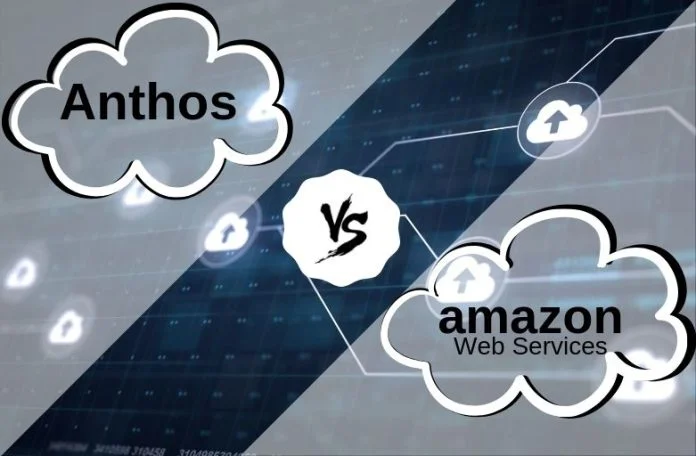A cloud platform is a software infrastructure that allows users to create their applications through cloud-based services.
These platforms enable users to develop and run applications in the cloud and make use of these services for managing their accounts over the internet.
Nowadays, the demand for virtualized technologies is continually increasing, and to keep pace with the current technologies enterprises are utilizing various cloud platforms to manage their application through a global network.
Google Anthos:
Google launched a new cloud-based management application platform named “Anthos” in 2019. The aim of this tool is to allow enterprises to run their application on existing on-premise hardware or in the public cloud.
It is a cloud service platform that the organization declared over a year ago and which is accessible on both the Google Cloud Platform (GCP) with Google Kubernetes Engine (GKE) and in your server farm with GKE On-Prem.
It provides flexibility to users to deploy their data centers on the Google cloud. Anthos, with its hybrid functionality and being a future-proof technology investment, it increases business innovations across the environment.
Amazon Web Services:
AWS, being the oldest computing platform, is facing a fierce cloud war. To increase its flexibility and to compete with the latest multi-cloud platform in the market, Amazon has announced to change its pricing model from “pay-as-you-go” to “pay-per-use AWS config rules”.
This feature allows users to pay only for the changes they have made in the cloud while eliminating all active config rules costs.
Instead, this model would help sustain AWS’s market position and push users to engage with this cloud computing platform actively.
Google Anthos vs. AWS:
Pricing:
- Anthos’ pricing is based on a monthly subscription with a minimum one-year commitment.
- AWS is based on the pay-as-you-go model of payment where users can hire the services as and when they need it.
Unique selling proposition:
- Anthos provides a multi-cloud platform which gives the flexibility to move on-premise without shifting it to any other technologies.
- AWS offers the highest priority to cloud security and has multi-layer security encryption, which provides a user with a tight security space.
Drawback:
- A significant disadvantage of Anthos is that it can only work with the Kubernetes engine.
- It becomes critical to use AWS with any other public cloud as it creates unexpected issues.
Range of services:
- Anthos’ services are limited in numbers i.e., installing and configuring servers, managing distributed infrastructures, automating policy, and security.
- AWS offers a broad umbrella of services, i.e., multi-layer security encryption, database management, development tools and application services, networking, big data analytics, storage management, and security governance.
Features:
- Anthos’ features include a clouding environment, networking environment, service management, Centralised config management, consolidated logging and monitoring, and unified user interface.
- AWS features vary from mobile-friendly access, serverless clouding, flexible and independent storage, AWS marketplace for searching and buying suitable software, auto-scaling, and balance loading facilities.
Can it survive in the presence of AWS and Microsoft Azure?
Anthos, with its hybrid computing, has more chances of survival than any other cloud computing platform.
It has a set standard of functioning, which gives flexibility to the user to deploy, manage, and run the application over existing technologies using a third-party cloud.
It seamlessly allows the user to get rid of the single locking cloud provider and provides ease in shifting the workload from one cloud to another service provider or on their services page.
Anthos is so far the unique and killer product that has multi-cloud capabilities which would enable it to give a tough fight in the near future also.
How is Google Anthos different from Microsoft Azure?
Microsoft Azure, formerly called Windows Azure, is a cloud computing platform that allows a user to manage and deploy applications over various networks through Microsoft-managed data centers.
Though both the cloud platforms serve to modernize the existing user application, Azure serves as a lesser user-friendly platform as compared to Google Anthos.
Anthos came out as a viable solution to manage on-premise networking with Kubernetes.
It offers operational consistency and stability, i.e., security, monitoring, and policy which can be configured in the same way. The factors which differentiate Anthos from Azure are:
- Google Kubernetes engine: It allows a user to manage, monitor, and secure a footprint at a single control point.
- Anthos configuration management: It brings automation to complex tasks and reduces security postures by deploying policies over the Kubernetes engine.
- GKE On-Prem: It allows the user to run their application in the in-house infrastructure and in the public cloud.
- Anthos Stackdriver: It provides a unified place to monitor, secure, store, and analyze logs and services within the cloud containers.
- Istio: It is a service mesh model that manages data sharing across various applications and allows the user to handle traffic over microservices.
Future of Google Anthos and AWS:
Anthos has a market hype but it also has a cut-throat competition. Its hybrid philosophy is going to change the level of expectation of users and other staging cloud computing platforms.
In a cloud war, Anthos is going to hit an application-centric approach with its Kubernetes engine and Istio.
This feature would instead help in simplifying the complexities of running and deploying any application by the user.
For AWS, the future challenge is to sustain a cloud war with a multi-cloud offering against the traditional single public cloud provider.
Conclusion:
Google Anthos and AWS, both cloud computing tools, have their benefits and applicability ground.
Anthos has a competitive edge over other cloud computing tools because it provides excellent reliability and administration over multi-cloud capabilities. It also allows users to deploy and run an application more easily without learning different technical landscapes and APIs.
Recommended For You:

